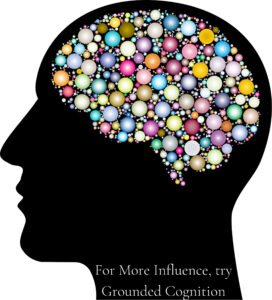What does your brain do when you hear the word ‘pepper’? What about ‘grasp’? Or ‘hat’?
All these words fire up not just your language circuits, but different senses through other relevant brain circuitry.
‘Pepper’ activates your taste circuits.
‘Grasp’, your motor movement circuits.
‘Hat’ – visual circuits. Whatever you see as a hat from past experience fires up the ‘seeing’ part of your brain.
To influence more effectively, we can improve our chances of motivating our audiences by using language that’s:
- Concrete
- Specific
We’ll come back to examples of these in a moment.
By being concrete and specific, we build a richer, more powerful experience for the listener or reader. If you do it well, they’re going to be more engaged and more motivated to ‘buy into’ what you’re offering, without them even realising it’s happening!
Whether you’re offering a product or service – or simply an opinion.
Don’t worry, this isn’t about using flowery or overly-descriptive language, which sounds weird and only puts people off. Adding lots of adjectives isn’t the solution.
Nor am I suggesting that we manipulate our audience – I’m assuming that your influencing is for good!
Let’s look at some examples of why using concrete and specific language can influence. But first, a definition.
What is grounded cognition, and how does it work?
Grounded cognition is a way of understanding how our thoughts and ideas are connected to our physical experiences and the world around us. It suggests that our thinking is not just happening in our heads, but rather emerges from the interactions between our brain, body, and environment.
And of course if you ever use a story* in your presentation or talk: a story well-done is a neatly packaged grounded cognition experience. As Chip Heath co-author of ‘Made to Stick‘ says:
Stories are flight simulators for our brains
So it makes sense that you want to set up a mental simulation for your audience.
How?
By being concrete and specific, as mentioned above.
- Concrete – Pomeranian, not simply ‘dog’; green tea, not ‘hot drink’.
- Specific – ideally, use the language they do. Listen for their metaphors in particular. Or if dealing with a company, scour the website or Annual Report.
See what I did there? ‘Scour’ creates a different experience in your brain compared to ‘read’: other senses such as touch, movement and even sound would have come into play. Even smell, if you associate scouring with a cleaning product!
You can see how ‘scour’ creates a richer experience for your senses than simply ‘read’.
And an example from customer research using over 1000 participants
Grant Packer and Jonas Berger are two business professors who’ve done research into grounded cognition. One study they did with a Canadian retailer found that more specific communication with consumers led to a spike of 30% in purchases made over the next 90 days. That’s a big jump!
Here’s their abstract from ‘How Concrete Language Shapes Customer Satisfaction’
Consumers are often frustrated by customer service. But could a simple linguistic cue help improve customer satisfaction? We suggest that linguistic concreteness– the specificity of words employees use when speaking to customers– can shape consumer attitudes and behaviors.
Five studies, including text analysis of over 1,000 real consumer-employee interactions in two different field contexts, demonstrate that customers are more satisfied, willing to purchase, and purchase more when employees speak to them concretely.
This occurs because customers infer that employees who use more concrete language are listening (i.e., attending to and understanding their needs).
These findings deepen understanding of how language shapes consumer behavior, reveal a psychological mechanism by which concreteness impacts person perception, and provide a straightforward way that managers could help enhance customer satisfaction.
In other words, you can improve how your listener, customer or audience perceives you by using concrete, specific words to engage more of their brain.
To sum up
Grounded cognition suggests that our thoughts and understanding are deeply connected to our bodies and experiences in the real world. It’s not just about thinking in our heads, but about how our physical interactions and sensations shape our thinking and meaning-making.
And this is one way to create greater impact, engagement and influence with your words.
Best wishes with your presentations and public speaking!
*More on story and mental simulation for persuasion in this post: Are Stories in Presentations Always Persuasive?


Leave a Reply